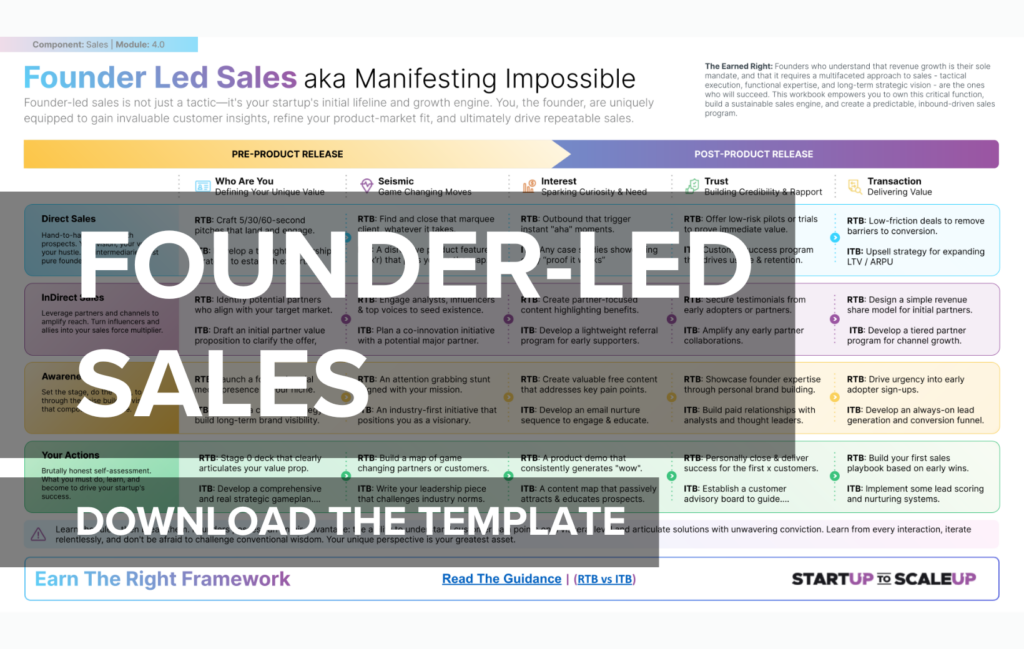How Can Startup Founders Build a Strong Sales Strategy?
Why is a strong sales strategy crucial for startup success?
A strong sales strategy is vital for startup success because:
- Revenue generation: It’s the primary driver of income and growth.
- Market validation: Sales prove that your product solves a real problem.
- Customer insights: Direct sales interactions provide valuable product feedback.
- Investor attraction: Strong sales metrics can help secure funding.
- Cash flow management: Consistent sales help manage startup finances.
- Competitive advantage: An effective sales process can set you apart in the market.
- Scalability: A well-designed sales strategy allows for efficient growth.
Without a solid sales strategy, even the best products can fail to gain traction in the market.
What are the key components of an effective startup sales strategy?
An effective startup sales strategy typically includes:
- Clear target market: A well-defined ideal customer profile (ICP).
- Value proposition: A compelling reason why customers should choose your product.
- Sales funnel: A structured process for moving leads from awareness to purchase.
- Lead generation tactics: Methods for attracting potential customers.
- Conversion optimization: Techniques to improve close rates.
- Customer retention plan: Strategies for encouraging repeat business and referrals.
- Sales metrics: Key performance indicators (KPIs) to track progress.
Tailor these components to your specific product, market, and business model for best results.
How can startup founders create an effective sales funnel?
To create an effective sales funnel:
- Define stages: Clearly outline each step from lead to customer (e.g., awareness, interest, decision, action).
- Map content: Create relevant materials for each stage (e.g., blog posts, case studies, demos).
- Implement tracking: Use tools to monitor leads’ progress through the funnel.
- Optimize for conversion: Identify and remove bottlenecks at each stage.
- Personalize the journey: Tailor interactions based on lead characteristics and behaviors.
- Automate where possible: Use technology to streamline repetitive tasks.
- Continually test and refine: Regularly analyze and improve each stage of the funnel.
Remember, the goal is to guide potential customers smoothly from initial awareness to purchase decision.
What are effective lead generation tactics for early-stage startups?
Effective lead generation tactics for startups include:
- Content marketing: Create valuable content that attracts your target audience.
- Social media engagement: Build a presence on platforms where your ICP spends time.
- Referral programs: Encourage satisfied customers to recommend your product.
- Networking: Attend industry events and build relationships.
- Partnerships: Collaborate with complementary businesses to reach new audiences.
- SEO optimization: Improve your website’s visibility in search results.
- Targeted advertising: Use platforms like Google Ads or LinkedIn for precise targeting.
Focus on tactics that align with your target market’s preferences and behaviors.
How can founders balance sales efforts with product development?
To balance sales and product development:
- Align goals: Ensure sales and product teams understand each other’s objectives.
- Implement feedback loops: Use sales insights to inform product development.
- Prioritize features: Focus on developing features that directly impact sales.
- Set realistic timelines: Coordinate product releases with sales cycles.
- Cross-functional teams: Foster collaboration between sales and product teams.
- Use data: Make decisions based on customer usage and sales metrics.
- Educate sales team: Keep sales staff updated on product capabilities and roadmap.
Remember, sales and product development should work synergistically to drive business growth.
What metrics should startups track to measure sales performance?
Key sales metrics for startups include:
- Conversion rate: Percentage of leads that become customers.
- Customer Acquisition Cost (CAC): Cost to acquire a new customer.
- Lifetime Value (LTV): Predicted revenue from a customer over time.
- Sales cycle length: Average time from first contact to closing a deal.
- Churn rate: Percentage of customers who stop using your product.
- Monthly Recurring Revenue (MRR): Predictable revenue generated each month.
- Pipeline velocity: Speed at which leads move through your sales funnel.
Regularly analyze these metrics to identify areas for improvement and track overall sales health.
How can startups effectively train and scale their sales team?
To train and scale a sales team effectively:
- Document processes: Create a clear, replicable sales playbook.
- Implement onboarding: Develop a structured program for new hires.
- Provide ongoing training: Regularly update skills and product knowledge.
- Use technology: Leverage CRM and sales enablement tools.
- Set clear KPIs: Establish measurable performance indicators.
- Foster a learning culture: Encourage knowledge sharing and continuous improvement.
- Lead by example: Have experienced team members mentor new salespeople.
As you scale, maintain a balance between standardization for efficiency and flexibility for individual selling styles.
Building a strong sales strategy is crucial for startup success, but it’s an ongoing process that requires continuous refinement. Start by deeply understanding your target market and crafting a compelling value proposition. Develop a structured sales funnel and implement effective lead generation tactics. Regularly analyze your sales metrics and use these insights to improve your processes. Remember, successful sales strategies align closely with product development and overall business goals.
By focusing on creating value for customers and continuously optimizing your approach, you can build a sales engine that drives sustainable growth for your startup.
